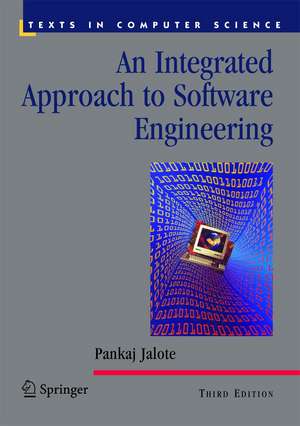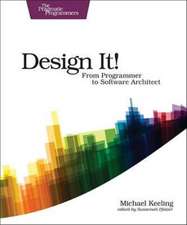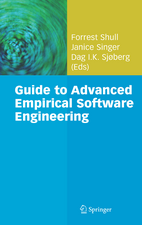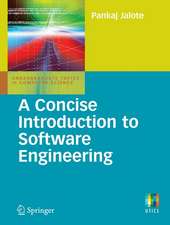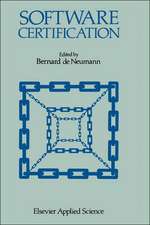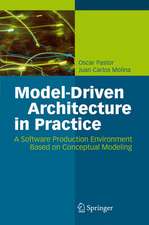An Integrated Approach to Software Engineering: Texts in Computer Science
Autor Pankaj Jaloteen Limba Engleză Paperback – 15 dec 2010
| Toate formatele și edițiile | Preț | Express |
|---|---|---|
| Paperback (1) | 602.72 lei 6-8 săpt. | |
| Springer Us – 15 dec 2010 | 602.72 lei 6-8 săpt. | |
| Hardback (1) | 612.29 lei 6-8 săpt. | |
| Springer Us – 12 oct 2005 | 612.29 lei 6-8 săpt. |
Din seria Texts in Computer Science
- 17%
 Preț: 366.69 lei
Preț: 366.69 lei - 20%
 Preț: 675.35 lei
Preț: 675.35 lei - 20%
 Preț: 370.59 lei
Preț: 370.59 lei - 20%
 Preț: 411.75 lei
Preț: 411.75 lei - 20%
 Preț: 306.35 lei
Preț: 306.35 lei - 20%
 Preț: 474.58 lei
Preț: 474.58 lei - 20%
 Preț: 1244.39 lei
Preț: 1244.39 lei - 20%
 Preț: 409.70 lei
Preț: 409.70 lei - 20%
 Preț: 379.63 lei
Preț: 379.63 lei - 20%
 Preț: 305.30 lei
Preț: 305.30 lei - 20%
 Preț: 406.21 lei
Preț: 406.21 lei - 20%
 Preț: 366.93 lei
Preț: 366.93 lei - 20%
 Preț: 503.87 lei
Preț: 503.87 lei - 20%
 Preț: 411.53 lei
Preț: 411.53 lei - 20%
 Preț: 444.93 lei
Preț: 444.93 lei - 20%
 Preț: 370.22 lei
Preț: 370.22 lei - 20%
 Preț: 441.70 lei
Preț: 441.70 lei - 20%
 Preț: 515.34 lei
Preț: 515.34 lei - 15%
 Preț: 637.58 lei
Preț: 637.58 lei - 20%
 Preț: 353.33 lei
Preț: 353.33 lei - 20%
 Preț: 356.82 lei
Preț: 356.82 lei - 20%
 Preț: 181.92 lei
Preț: 181.92 lei - 20%
 Preț: 330.42 lei
Preț: 330.42 lei - 20%
 Preț: 743.62 lei
Preț: 743.62 lei - 20%
 Preț: 663.45 lei
Preț: 663.45 lei -
 Preț: 457.75 lei
Preț: 457.75 lei - 20%
 Preț: 536.66 lei
Preț: 536.66 lei - 20%
 Preț: 358.24 lei
Preț: 358.24 lei -
 Preț: 385.84 lei
Preț: 385.84 lei - 20%
 Preț: 394.57 lei
Preț: 394.57 lei - 20%
 Preț: 344.76 lei
Preț: 344.76 lei - 20%
 Preț: 621.18 lei
Preț: 621.18 lei - 20%
 Preț: 350.86 lei
Preț: 350.86 lei - 20%
 Preț: 348.89 lei
Preț: 348.89 lei - 20%
 Preț: 339.95 lei
Preț: 339.95 lei - 20%
 Preț: 588.21 lei
Preț: 588.21 lei - 20%
 Preț: 199.57 lei
Preț: 199.57 lei - 20%
 Preț: 341.30 lei
Preț: 341.30 lei - 23%
 Preț: 726.93 lei
Preț: 726.93 lei - 20%
 Preț: 325.30 lei
Preț: 325.30 lei - 20%
 Preț: 595.80 lei
Preț: 595.80 lei - 20%
 Preț: 593.48 lei
Preț: 593.48 lei -
 Preț: 454.30 lei
Preț: 454.30 lei
Preț: 602.72 lei
Preț vechi: 753.40 lei
-20% Nou
Puncte Express: 904
Preț estimativ în valută:
115.34€ • 120.27$ • 95.86£
115.34€ • 120.27$ • 95.86£
Carte tipărită la comandă
Livrare economică 20 martie-03 aprilie
Preluare comenzi: 021 569.72.76
Specificații
ISBN-13: 9781441935441
ISBN-10: 1441935444
Pagini: 580
Ilustrații: XIV, 566 p.
Dimensiuni: 181 x 235 x 30 mm
Greutate: 0.96 kg
Ediția:Softcover reprint of hardcover 3rd ed. 2005
Editura: Springer Us
Colecția Springer
Seria Texts in Computer Science
Locul publicării:New York, NY, United States
ISBN-10: 1441935444
Pagini: 580
Ilustrații: XIV, 566 p.
Dimensiuni: 181 x 235 x 30 mm
Greutate: 0.96 kg
Ediția:Softcover reprint of hardcover 3rd ed. 2005
Editura: Springer Us
Colecția Springer
Seria Texts in Computer Science
Locul publicării:New York, NY, United States
Public țintă
GraduateCuprins
Software Engineering Challenges.- Software Processes and Process Models.- Project Management.- Software Configuration Management.- Software Requirements Analysis and Specification.- Software Architecture and Design.- Project Planning.- Project Scheduling and Staffing.- Software Quality Management.- Rish Management.- Structured Design Methodology.- Object-Oriented Design and Design Methodology.- Programming Principles and Guidelines.- Testing Methodologies.- Defect Analysis and Prevention.
Recenzii
From the reviews of the third edition:
"Engineering and project management are the two major types of skills required in software engineering. This book discusses those skills. … The book is well written and well organized; it starts with the most basic software engineering concepts, and then goes gradually toward the most advanced ones. The book ends with a comprehensive index, and an up-to-date list of references. I can recommend this book for all teachers who want to present a first course in software engineering for graduate students." (Soraya Kouadri Mostefaoui, ACM Computing Reviews, Vol. 49 (3), March, 2008)
"Engineering and project management are the two major types of skills required in software engineering. This book discusses those skills. … The book is well written and well organized; it starts with the most basic software engineering concepts, and then goes gradually toward the most advanced ones. The book ends with a comprehensive index, and an up-to-date list of references. I can recommend this book for all teachers who want to present a first course in software engineering for graduate students." (Soraya Kouadri Mostefaoui, ACM Computing Reviews, Vol. 49 (3), March, 2008)
Textul de pe ultima copertă
An Integrated Approach to Software Engineering introduces software engineering to advanced-level undergraduate and graduate students of computer science. It emphasizes a case-study approach whereby a project is developed through the course of the book, illustrating the different activities of software development. The sequence of chapters is essentially the same as the sequence of activities performed during a typical software project. All activities, including quality assurance and control activities, are described in each chapter as integral activities for that phase of development. Similarly, the author carefully introduces appropriate metrics for controlling and assessing the software process.
Chapters in this revised edition, updated for today’s standards, include these new features:
Software Process: a discussion on the timeboxing model for iterative development and on inspection process
Requirements Analysis and Specification: a description of Use Cases
Software Architecture: an additional chapter for this edition
Project Planning: some practical techniques for estimation, scheduling, tracking, and risk management
Object Oriented Design: a discussion on UML and on concepts such as cohesion, coupling and open-closed principle
Coding: sections on refactoring, test driven development, pair programming, common coding defects, coding standards, and some useful coding practices
Testing: a presentation on pair-wise testing as an approach for functional testing, defect tracking, and defect analysis and prevention
The text, bolstered by numerous examples and chapter summaries, imparts to the reader the knowledge, skills, practices and techniques needed to successfully execute a software project.
Chapters in this revised edition, updated for today’s standards, include these new features:
Software Process: a discussion on the timeboxing model for iterative development and on inspection process
Requirements Analysis and Specification: a description of Use Cases
Software Architecture: an additional chapter for this edition
Project Planning: some practical techniques for estimation, scheduling, tracking, and risk management
Object Oriented Design: a discussion on UML and on concepts such as cohesion, coupling and open-closed principle
Coding: sections on refactoring, test driven development, pair programming, common coding defects, coding standards, and some useful coding practices
Testing: a presentation on pair-wise testing as an approach for functional testing, defect tracking, and defect analysis and prevention
The text, bolstered by numerous examples and chapter summaries, imparts to the reader the knowledge, skills, practices and techniques needed to successfully execute a software project.
Caracteristici
Third edition has been revised and updated using today’s standards to teach the sequence of activities performed during a typical software project. Updates include a chapter on Software Architecture, use of Universal Modeling Language (UML) as the notation for specification, and greater emphasis on Iterative Development Uses a case study approach taking the reader through the life cycle of applying the concepts to practices on real-life projects The practical orientation shows students how to apply their knowledge to real-life projects in the commercial world As a value-added bonus to the third edition, the author provides a website for support material Includes supplementary material: sn.pub/extras
